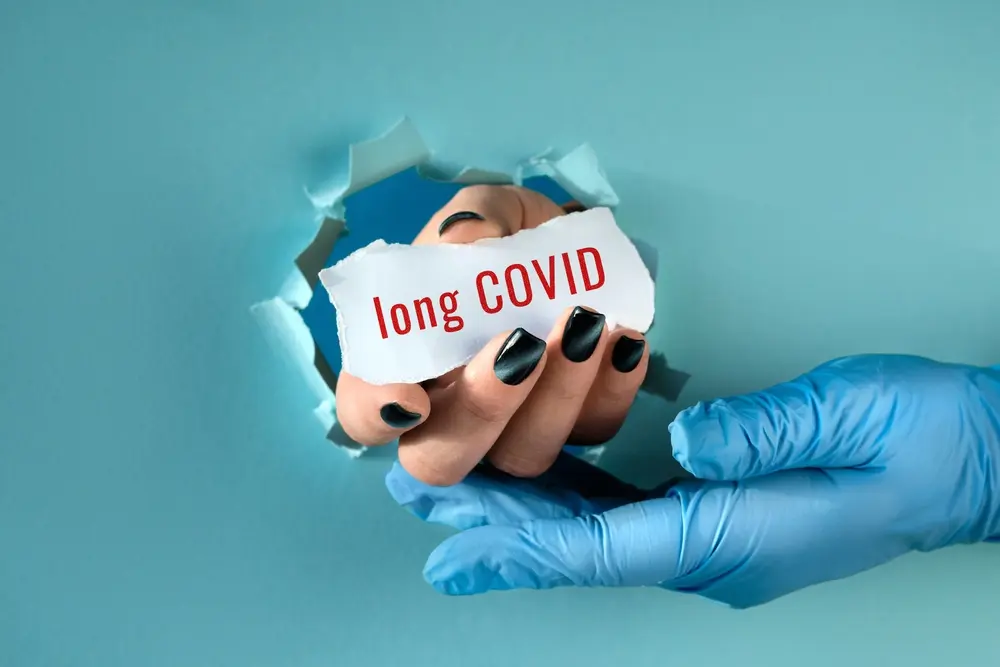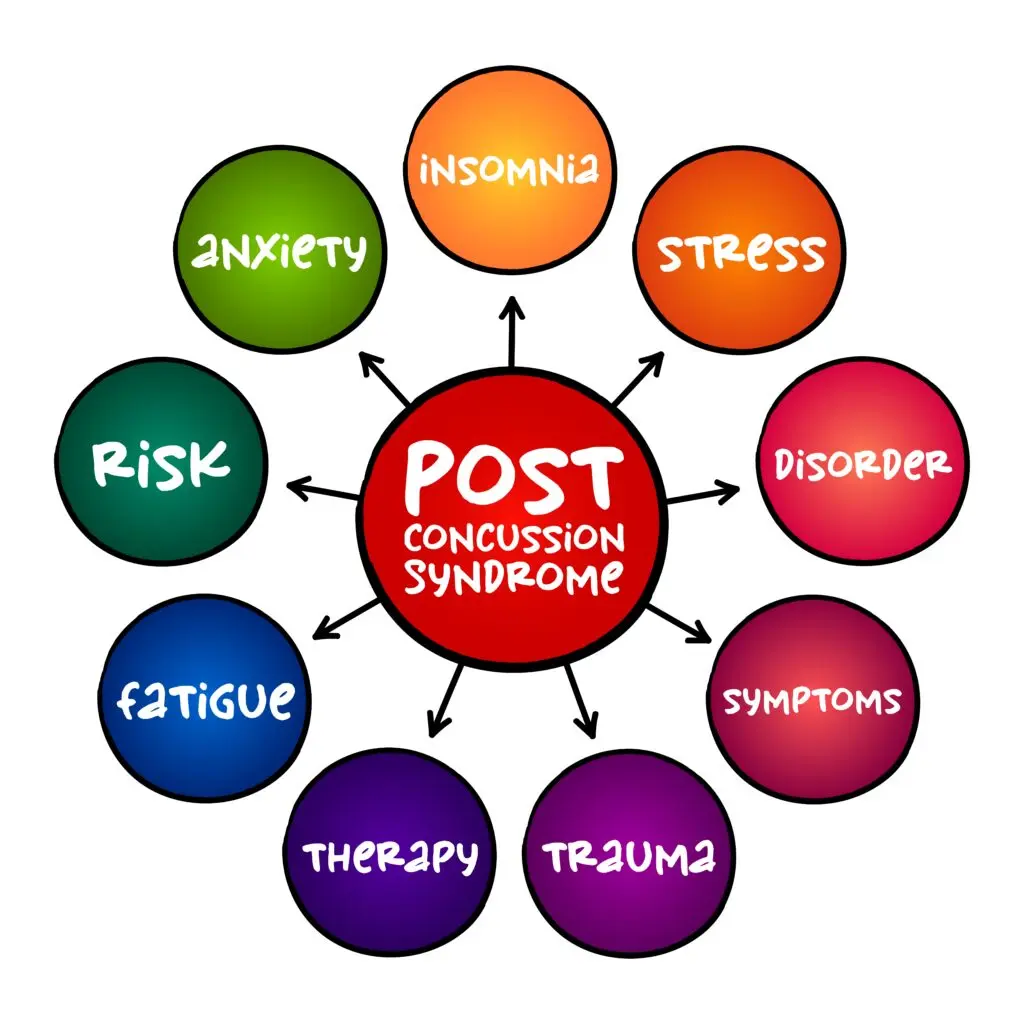Concussion & Long COVID Treatment in Charlotte, NC
Long-haul COVID (aka: “Long COVID” or PASC – Post-Acute Sequelae of SARS-CoV-2 infection) is a post-COVID-19 chronic illness, that can present with wide-ranging symptoms lasting weeks, months, or even years after COVID-19 illness.

A Look at the Data
- Nearly ⅓ of patients with MILD initial COVID infections are diagnosed with Long COVID.
- 90% of people living with Long COVID initially only experienced mild-moderate illness – not requiring hospitalization.
- The most common symptoms, listed below, are similar to traumatic brain injury (TBI) symptoms.
- Long COVID symptoms have an impact on health that is as severe as the long-term effects of TBI.
- Patients hospitalized for COVID are at greater risk of developing Long COVID.
There is no uniformity of symptoms between two people, even relatives – individual experiences can be very different. One person may have only 1-2 of the following consistently, while another person may have multiple symptoms that wax & wane over time:
Symptoms of Long COVID
Neurological Symptoms
- Fatigue – a tired feeling not relieved by rest
- Brain fog – difficulty concentrating or thinking
- Headaches
- Sleep problems, including insomnia
- Weakness
- Dizziness, initially when standing
- Tremor
- A change or loss of smell, this may also include taste
- A change in your hearing, such as decreased ability to hear or tinnitus (ringing in the ears)
- A change in your vision that may include:
- Blurry vision or difficulty reading or focusing on objects
- Floaters
- Flashing lights
- Photophobia (sensitivity to light)
- Depression
- Anxiety
- Abnormal movements
Other / Physical Symptoms
- Rapid or pounding heartbeat
- Palpitations or skipped heartbeats
- Back pain
- Muscle and/or joint pain
- Shortness of breath
- Sleep apnea
- Cough
- Chest pain, tightness, or pressure
- Gastrointestinal symptoms, such as diarrhea, constipation
- Fever, sweats, and/or chills
- Hair loss
- Changes in skin color
Often, symptoms worsen after physical or mental activity.
In some cases, Long COVID symptoms cause difficulties for people performing everyday chores; others find the symptoms make returning to work or school challenging. This sounds a lot like a concussion.
COVID-19 is especially damaging to the lining of blood vessels – as such, it can damage multiple organs, most notably brain, kidneys, heart, liver, pancreas, lungs and the gastrointestinal system (especially the intestines). When this happens, it can increase the risk of the person developing new medical conditions, such as:
- Neurological disorders
- Kidney disease
- Diabetes
- Heart conditions
- Postural Orthostatic Tachycardia Syndrome (POTS), a feeling of lightheadedness or fainting, accompanied by an increase in your heart rate (pulse) when you stand up.
Our understanding of how to treat Long COVID is a rapidly expanding knowledge base – it is important to see a Physician and begin care early. If you are experiencing any of these symptoms, contact us now for an appointment! Let’s work together to move you toward health!
Concussion Info
What Is Concussion?
Concussion is a mild form of traumatic brain injury that can be caused by a mild bump, or more serious hit to the head, or even by violent shaking of the head and body. Loss of consciousness is NOT required to have a concussion. Why is this important? Many people “just walk it off” and are not correctly diagnosed with a concussion, thus delaying or never receiving much-needed medical care.
Concussion symptoms are often subtle and not immediately evident. Sometimes, the patient will doubt whether or not a symptom is real or “just in their head.” At other times, friends and family are the ones who notice symptoms first.

Common Symptoms After Mild Traumatic Brain Injury
Neurologic symptoms
- Brain fog – difficulty concentrating or thinking
- Poor or decreased coordination
- Headache
- Dizziness or “seeing stars”
- Ringing in the ears
- Amnesia surrounding the event
Other / Physical symptoms
- Nausea / Vomiting
- Fatigue or drowsiness
- Blurry vision
Someone may observe these symptoms in a concussed person:
- Temporary loss of consciousness, however this does not always happen
- Slurred speech
- Taking excess time to respond to questions
- Dazed appearance
- Forgetfulness in conversation (asking the same question multiple times)
Symptoms of a concussion can occur immediately, however, they may not appear until a few days after the injury. These may include some or many of the following:
- Difficulty concentrating
- Difficulty remembering new or old information
- Irritability with situations and other people
- Personality changes
- Photophobia/Phonophobia
- Difficulty with sleep – falling asleep or staying asleep, or both
- Increased emotional feelings
- Depression
- A change or loss of smell, this may also include taste
Symptoms can last for days, weeks or even much longer. It is important to initiate care as soon as possible following an injury.
Treatment
Recovery from both Long COVID and TBI/Concussion takes time. We will provide an individually-tailored treatment plan based on the patient’s specific symptoms and functional limitations.
RPM offers a unique approach of both traditional medications and Osteopathic Manual Medicine – helping the body heal itself. OMM has the potential to speed up recovery time and improve how you feel while you recuperate!
Long COVID and Concussion share significant similarities – as a TBI Rehab trained Physician, Dr. Estes is well-positioned to help you!
If you are experiencing any of these symptoms, contact us now for an appointment! Let’s work together to move you toward health!
